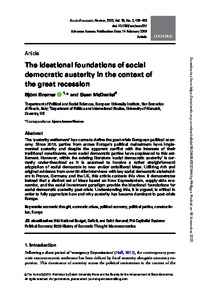The ideational foundations of social democratic austerity in the context of the great recession

Bremer, Björn ; McDaniel, Sean
2020
18
2
April
439-463
economic recession ; economic policy ; government policy ; economic recovery
Business economics
https://doi.org/10.1093/ser/mwz001
English
Bibliogr.
"The ‘austerity settlement' has come to define the post-crisis European political economy. Since 2010, parties from across Europe's political mainstream have implemented austerity and despite the apparent conflict with the interests of their traditional constituents, even social democratic parties have acquiesced to this settlement. However, within the existing literature ‘social democratic austerity' is currently under-theorized as it is assumed to involve a rather straightforward adaptation of social democrats to neo- and/or ordoliberal ideas. Utilizing rich and original evidence from over 60 elite interviews with key social democratic stakeholders in France, Germany and the UK, this article contests this view. It demonstrates instead that a distinct set of ideas based on New Keynesianism, supply-side economics, and the social investment paradigm provide the ideational foundations for social democratic austerity post-crisis. Understanding this, it is argued, is critical in order to fully appreciate how and why austerity has become dominant in post-crisis Europe."
Digital
The ETUI is co-funded by the European Union. Views and opinions expressed are however those of the author(s) only and do not necessarily reflect those of the European Union or the ETUI.